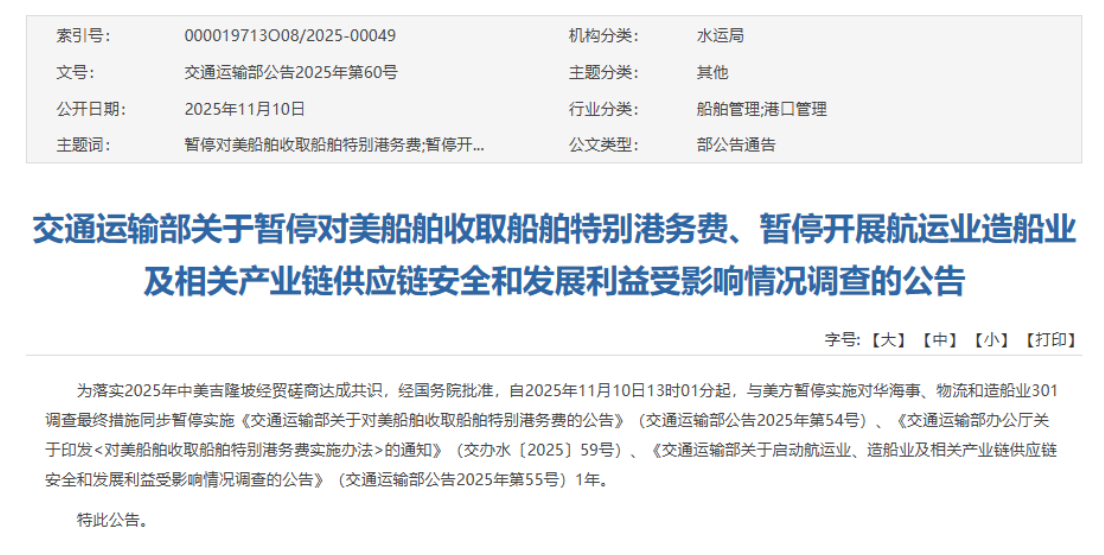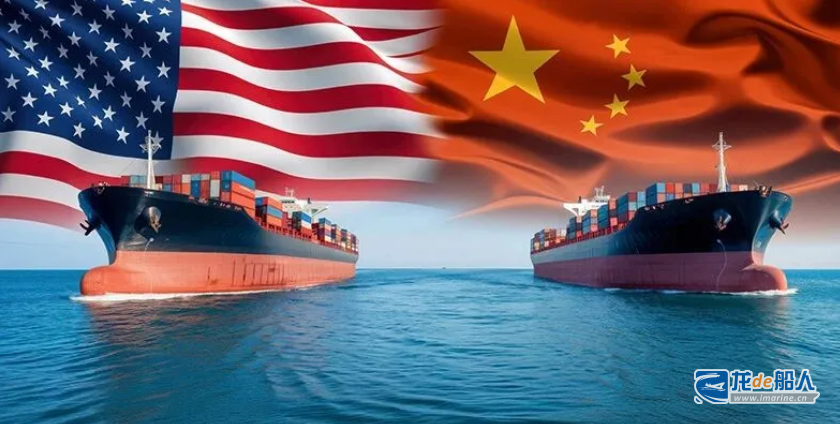Effective today, the global shipbuilding industry officially begins a one-year “buffer period”, and the suspension of port fees between China and the United States officially took effect on November 10.

On November 10, China’s Ministry of Transport issued an announcement suspending the collection of special port fees from U.S. vessels and halting the investigation into the impact on the security and development interests of the shipping, shipbuilding, and related industrial chains and supply chains. Here is the accurate and official English translation of the announcement, which adheres to the terminology norms of international trade and maritime affairs and maintains the rigorous tone of government announcements:
As stated in the announcement, to implement the consensus reached at the 2025 China – US economic and trade consultations held in Kuala Lumpur, and with the approval of the State Council, starting from 13:01 on November 10, 2025, China will suspend the implementation of three documents for one year in parallel with the suspension of the final measures of the US Section 301 investigation targeting China’s maritime, logistics and shipbuilding industries. The three documents are: Announcement of the Ministry of Transport on Collecting Special Harbor Dues for US – Registered Vessels, Circular of the General Office of the Ministry of Transport on Printing and Distributing the Implementation Measures for Collecting Special Harbor Dues for US – Registered Vessels and Announcement of the Ministry of Transport on Launching an Investigation into the Impact on the Security and Development Interests of the Shipping Industry, Shipbuilding Industry and Their Related Industrial and Supply Chains.
As the Ministry of Transport announced decisions including the suspension of collecting special port fees from U.S. vessels, the Ministry of Commerce announced the suspension of countermeasures against five U.S.-related subsidiaries of Hanwha Ocean for one year, effective from November 10, 2025.

As early as October 14, the Ministry of Commerce announced that it would add five U.S. subsidiaries of Hanwha Ocean—Hanwha Shipping LLC, Hanwha Philly Shipyard Inc., Hanwha Ocean USA International LLC, Hanwha Shipping Holdings LLC, and HS USA Holdings Corp—to its retaliatory list and take the following countermeasures: prohibiting organizations and individuals within China from engaging in related transactions or cooperation with them, effective October 14, 2025. This move is aimed at countering the U.S. Section 301 investigations into China’s maritime, logistics, and shipbuilding industries.
It is understood that Hanwha Philly Shipyard Inc., which appears on the sanctions list, was formerly known as Hanwha Philly Shipyard. Hanwha Group, the parent company of Hanwha Ocean, acquired it for $100 million at the end of 2024 and subsequently renamed it. The shipyard not only undertakes new projects but also provides multiple services including repairs, overhauls, and conversions. Hanwha Group plans to develop it into a key base for the U.S. Navy’s shipbuilding and maintenance, repair, and overhaul (MRO) operations, and has announced a US$5 billion investment for expansion and upgrades.
Hanwha Shipping LLC, also included on the sanctions list, recently placed an order for 12 new vessels with the Hanwha Philly Shipyard.
Hanwha Philly Shipyard operates the largest dry dock in the United States, spanning 480,000 square meters. Its operations encompass both government and commercial projects, covering shipbuilding, repair, and maintenance services. The shipyard specializes in constructing merchant vessels for coastal transportation, having built approximately 50% of the large merchant ships in the United States that comply with the Jones Act, including tankers and container ships.
Days before the suspension of port fees for Chinese ships took effect, the Trump administration announced it would engage in negotiations with China based on issues raised in the Section 301 investigation. It formally declared a one-year suspension of port fees on Chinese-affiliated ships, effective November 10.
Earlier this year, the United States announced plans to impose port fees on ships built in China, reportedly with the aim of “weakening China’s influence on the global shipping industry and boosting the United States shipbuilding industry.” In response, China immediately initiated retaliatory charges on ships with ties to the United States, which took effect on October 14th (the day the United States charges took effect).
Shortly after the port fee measures took effect, China and the United States reached a consensus during economic and trade consultations in Kuala Lumpur: the United States would suspend for one year the implementation of its Section 301 investigation measures targeting China’s maritime, logistics, and shipbuilding industries. Following the United States suspension of these measures, China would also suspend its countermeasures against the United States for one year.


